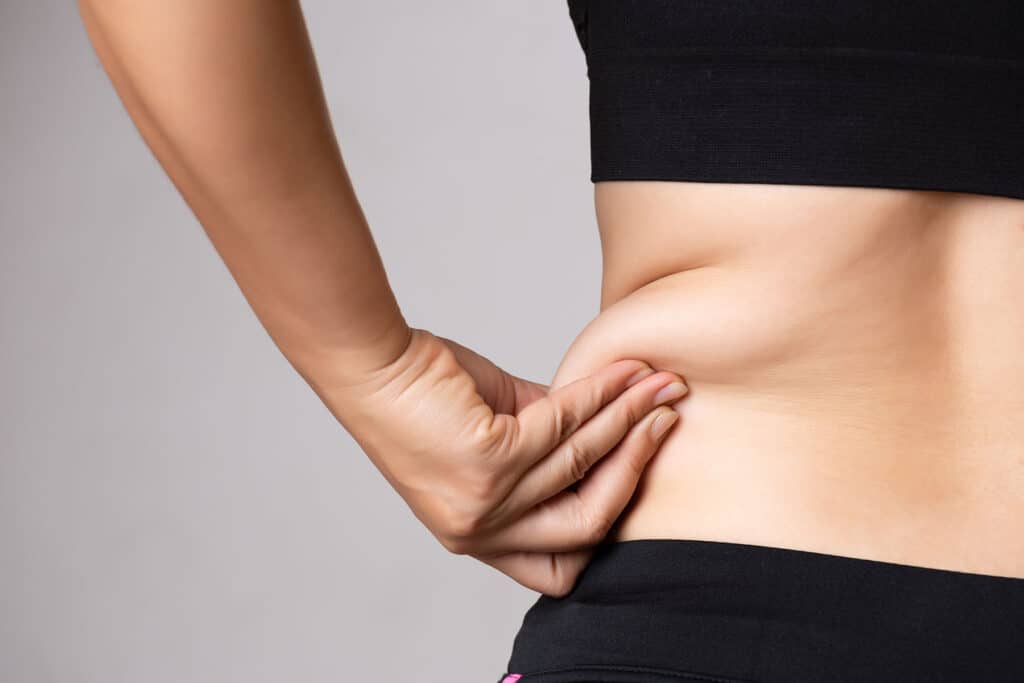Do you feel like weight gain during menopause happens no matter how much you exercise or how little you eat?
We hear this a lot.
You’re doing the same thing you’ve always done but the weight is piling on. So you start exercising harder and eating like a bird. Nothing happens. Even your usual ‘no-fail weight loss tricks’ won’t move the needle.
Welcome to life post-40.
This is a pretty common scenario for weight gain during menopause. Not everyone will experience significant gains but 3-5 kg’s isn’t uncommon and we’ll all experience altered body shape.
Take heart, a little bit of knowledge and you can nail this.
Weight gain during menopause is partly due to hormone shifts…
We’re moving into the perimenopause phase of our lives before transitioning through to post-menopause. During this time our progesterone, estrogen, and testosterone go a little helter-skelter.
Indeed, the hormones progesterone, estrogen, testosterone, cortisol, insulin, and thyroid all need to work together in symphony. This helps you maintain a weight you’re happy with.
These hormones are the regulators of our metabolism, fat storage and blood sugar. And if one goes out of whack it can lead to weight gain as well as cravings (hello carbohydrates and sugar), tiredness, and sleep issues.
Related: It’s not just about estrogen.
…and partly due to ageing
As we age our fat increases and muscle mass reduces in a process called sarcopenia. Indeed, the amount of muscle we have contributes to how fast our metabolism is. Subsequently, a metabolic slowing down makes it more difficult to maintain our weight. In addition, as the ratio of our hormones change the body shifts where it deposits fat. It tends to move from the hips and thighs to settle around the belly area.
Over-exercising and eating like a bird won’t help with weight gain during menopause.
In fact, they may cause you to hold onto the weight or – eeek – gain more!
The key is in nurturing the hormonal shifts. Eating more can often help too. By that we mean eating more of the good stuff like fresh vegetables. Think of it as ‘adding in’ frequent serves of whole foods (lots of plants work well). Accordingly, you’ll want to ‘crowd out’ things like refined sugars and carbohydrates.
So remember to: ‘add in’ and ‘crowd out’.
10 reasons you may be experiencing weight gain during menopause
1. Too much stress
Cortisol is the stress hormone. When we produce too much cortisol it naturally assumes – as it did in caveman days – that we must run for our lives. So it puts us in ‘fight or flight’ mode. Then it dumps extra sugar into our blood to give us the fuel to escape.
As we don’t actually need the extra glucose in modern times, insulin comes in to mop up the excess. The insulin then stores it as fat for when we need it in the future. Consequently, the body holds onto that fat for dear life – a protective shell against perceived threats.
Therefore, if you don’t find a way to reduce your stress levels your body will think it’s in constant danger. And you won’t be able to shift that fat.
2. Not enough sleep
A good night’s sleep is rejuvenating and helps to regulate your hormones. If you’re experiencing disturbed sleep it’s stressful. And the adrenals will produce more cortisol (number 1) as well as encouraging the body to hold onto its fat stores. Science has also shown not sleeping well increases the hunger hormone ghrelin.
Related: Your Sleep Hygiene Guide
3. Not doing the right exercise
Choosing the right form of exercise is key at midlife. Over-exercising is something to be avoided at all costs. Basically, it will put the body back into the mode of overproducing cortisol and storing fat (see number 1). However, done well exercise helps balance the hormones and lowers cortisol levels.
Indeed, exercise is essential to a healthy life so we don’t want to discourage movement. Especially not when sitting is touted as the new smoking and many of us are doing too much of it. Weight loss/management is driven by what you do in the kitchen 80% of the time. However, a well-exercised 40+ female body will thrive and muscle and metabolism will be at optimal levels.
The general consensus is that moderate exercise is the best option post-40. Long walks, Pilates, yoga, stretching, deep breathing, swimming and weight lifting. What’s more, increasing research shows the benefits of HIIT (High-Intensity Interval Training) in midlife. HIIT stands for ‘short bursts of high intensity alternating with lower intensity exercise’. That said, we’d recommend proceeding with caution if you’re experiencing sleep issues/stress-related issues until you are more balanced.
Getting the heart rate up and strengthening your muscles feels good and is great for you. Both physically and mentally. But if you go too hard your body will go back into stress mode (see number 1). There’s no one size fits all though. Certainly, if you’re someone who has always done triathlons and endurance sports you will know how your body works best.
4. Sugar & refined carbohydrate overload
We talk about sugar and refined carbohydrates a lot (refined carbs convert to sugar). This is because they can exacerbate unwelcome menopause symptoms and are easily converted into stored fat.
In addition, a high-sugar diet can lead to insulin resistance (pre-diabetes) over time. Put very simplistically, the pancreas produces the hormone insulin to convert sugar to glucose for energy. During insulin resistance this process is impaired. As a result, the pancreas produces more and more insulin to try and move the sugar from the blood to the cells for energy. When it doesn’t work it leads to blood sugar crashes, more cravings and fat storage. As well as that it creates a predisposition to diseases like Type 2 diabetes.
In a nutshell: Insulin resistance equals fat storage. It’s a rollercoaster. The more insulin we produce, the more fat we store. And the more fat we store, the more we crave carbs and sugar. So the more carbs and sugar we eat, the more insulin we produce.
5. Not enough fat & protein
Women used to avoid fat like the plague and some still do! But GOOD fat is essential for a healthy weight, satiety, and – as an aside – our skin loves it too. Fat is key to making our hormones, helping our body absorb nutrients and healthy brain function. Good fats include nuts, seeds, avocado, extra virgin olive oil, and oily fish like salmon and tuna. As a rule, if you’re not eating enough fat you’re usually compensating with sugar. In fact, that’s how much of the ‘low-fat’ industry works. They remove the fat but add sugar (see above) so go for full fat every time.
Don’t stint on protein either as it keeps you nice and full. It also helps to keep blood sugar levels stable thereby not over-stimulating insulin (see number 4). A good trick is to pair protein with your carbs. i.e. eat your fish with sweet potato, make a stir-fry with eggs with quinoa and peas/broccoli/spinach. Or have some overnight oats soaked in soy/almond milk with banana and slivered almonds.
NB: The liver shrinks in size by up to 40% in midlife and processed foods and saturated fats impact it, so it’s best to avoid coconut oil which is a saturated fat.
6. Failing at fibre
If you’re not eating enough fibre you’re likely not pooping enough. And if you’re not pooping your belly could be feeling quite well-upholstered (and maybe bloated). Accordingly, your body will be holding onto toxins and excess fat. The natural remedy is to load up on high fibre foods like fruit, veggies and wholegrains. (Such as the suggested foods in number 5.)
7. Food intolerances
While you may have always been able to eat whatever you want food intolerances can rear their head at midlife. Alternatively, they may have been there all along but you are now more sensitive to them. Certain intolerances can trigger blood sugar imbalance and inflammation encouraging difficult to shift weight gain. Common sensitivities for women during menopause include gluten, sugar and dairy. Eliminate them for three or four weeks and keep a diary of how you feel.
8. Thyroid issues
Problems with your thyroid are extremely common as we grow older. And this can cause everything in the body to become sluggish. Especially your metabolism and energy levels.
And hello weight gain!
Indeed, whenever anyone says they’re doing all the ‘right things’ and eating well I always ask about their thyroid health. Because if it’s playing up, it doesn’t matter what you do you won’t be able to lose weight. I highly recommend a full panel thyroid test. The standard tests in Australasia only measure TSH (thyroid stimulating hormone) levels. Unfortunately, they may come back normal even if you have thyroid problems. Ideally, you need your T3 and T4 levels tested too for a clear picture. This is why I suggest finding a good functional medicine practitioner who will do this for you.
Tip: The thyroid loves zinc (pumpkin seeds), iodine (seaweed foods like kombu and kelp) and selenium (brazil nuts).
9. Digestive disorders
You can’t go far these days without hearing about the gut (aka digestion). This is because it’s incredibly important. Indeed, 90% of our immunity lies in our gut. And a healthy balanced gut flora or microbiota (bacteria, fungi, viruses) equates to efficient weight management as well as optimal health.
Our gut is host to millions of flora – both good and bad. In fact, we have far more bacteria in our gut than we do cells in our body. As a rule, all of them co-exist harmoniously. However, if we allow them to get off-kilter by not eating well, taking too many medications, and/or being over-stressed (see number 1) it can lead to cravings (see number 4) and an imbalance of good guys and bad guys. This can lead to weight gain and a host of other conditions.
Tip: We suggest taking a synbiotic probiotic/prebiotic like Happy Go Tummy®. Also try including fermented foods (sauerkraut and kombucha) in your diet to help keep your gut microbiome healthy. Tip: provided you are not histamine intolerant.
Free Webinar: How Gut Health Impacts Your Menopause Journey
10. Toxins/xenoestrogen/endocrine disruptor exposure
We live in a world packed with hundreds of thousands of chemicals. They’re in our food, environment, personal care, medications, and household cleaners. Potential side effects can include imbalanced hormones and weight gain. There’s even a new term: obesogens. Aka endocrine disruptors that contribute to weight gain and obesity. These toxins disrupt hormones but they also interfere with the thyroid and our metabolism, contributing to body fat accumulation.
Related:
Conclusion
Weight gain during menopause can be a challenge so we hope these 10 pointers were helpful.
- fluctuating hormones
- slowing down of the metabolism with age
- thyroid issues
- insulin imbalance
- high cortisol
All can be contributors to hard-to-shift weight gain during menopause.
There can be a plethora of other reasons too.
Drinking too much (alcohol and/or coffee are often culprits here) and not drinking enough water.
Keeping hydrated with plain water will be your best friend if you’re trying to maintain your weight.
You can read about water and weight loss and get some great water recipes here.











